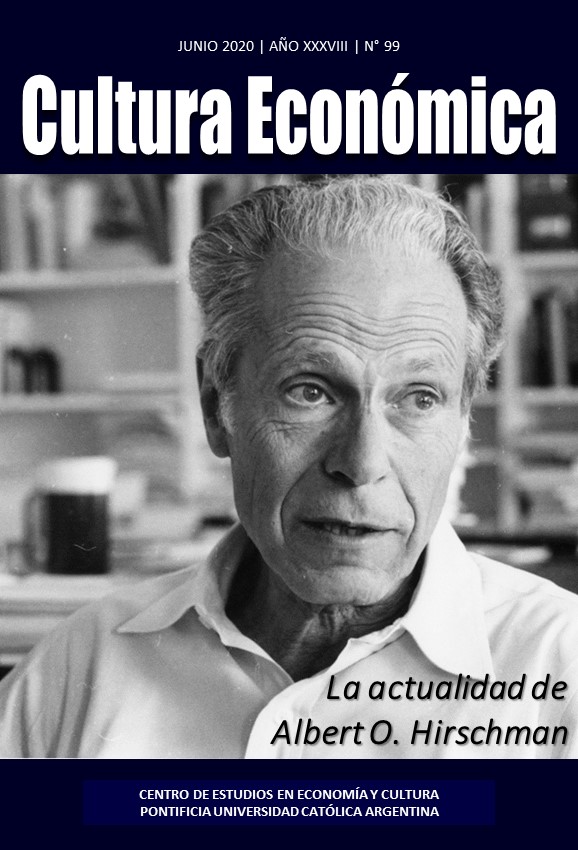Imaginative projection, disappointment and change: the principle of conservation and mutation of social energy in Albert O. Hirschman
Keywords:
ALBERT O. HIRSCHMAN, IMAGES OF CHANGE, SOCIAL CHANGE, PRINCIPLE OF CONSERVATION AND MUTATION OF SOCIAL ENERGY, DEVELOPMENTAbstract
This work proposes a re-reading of the principle of conservation and mutation of social energy, as core of the essay Getting Ahead Collectively (1984) by Albert O. Hirschman, in light of the sequential conception of social change starting from the images of change according to The Strategy of Economic Development (1958), and its deepening through the study of the dialectic of imagination and disappointment that underlies the cyclical succession of social action in Shifting Involvements (1982). This interpretation implies to highlight the particularities of the Hirschmanian approach in the analysis of human action through the process of formation of expectations of the agents as well as of the volitional and emotional factors linked with the possibility and sense of social change.Downloads
References
Adelman, J. (2013). Worldly Philosopher: The Odyssey of Albert O. Hirschman. Princeton: Princeton University Press.
Alacevich, M. (2017). “Albert Hirschman’s approach of observation in ‘Development Projects Observed’”. En Meldolesi, L. y Stame, N. (eds.). For a Better World. Excerpts from the First Conference on Albert Hirschman’s Legacy: Theory and Practice. Roma: IDE.
Blanco, L. A. (2013). “Hirschman: Un gran científico social”. Revista de Economía Institucional, Vol. 15, N° 28, 47-64.
Carrión, G. (2019). “Cambio, acción humana y desarrollo en Albert O. Hirschman: reflexiones económico-filosóficas a sesenta años de The Strategy fo Economic Development”. Iberian Journal of the History of Economic Thought, 6(2), 157-74.
De Haan, P. (2016). From Keynes to Piketty. The Century that Shook Up Economics. London: Palgrave Macmillan.
Feinstein, O. (2017). “A Hirschmanian approach to development evaluation”. En Meldolesi, L. y Stame, N. (eds.). For a Better World. Excerpts from the First Conference on Albert Hirschman’s Legacy: Theory and Practice. Roma: IDE.
Flyvbjerg, B. (2016). “The Fallacy of Beneficial Ignorance: A Test of Hirschman’s Hiding Hand”. World Development, Vol. 84, 176-189.
Furió-Blasco, E. (ed.) (1998). Albert O. Hirschman y el camino hacia el desarrollo económico. Una antología de ensayos anteriores a “La estrategia del desarrollo económico”. México: Fondo de Cultura Económica.
Ginzburg, A. (2016). “The Contemporary Significance of a Dissenter: Albert O. Hirschman’s Idea of Development”. Research in the History of Economic Thought and Methodology, Volume 34B, 63-90.
Hargreaves Heap, S. P. (2016). “‘Good and Bad’ (not ‘Good or Bad’): Albert O. Hirschman as a Behavioral Economist”. Research in the History of Economic Thought and Methodology, Volume 34B, 161-174.
Hirschman, A. O. (1958). The Strategy of Economic Development. New Haven: Yale University Press.
Hirschman, A. O. [1958] (1961). La estrategia del desarrollo económico. México: Fondo de Cultura Económica.
Hirschman, A. O. [1963] (1964). Estudios sobre política económica en América Latina (En ruta hacia el progreso). Madrid: Aguilar.
Hirschman, A. O. [1967] (1969). El comportamiento de los proyectos de desarrollo. México: Siglo XXI.
Hirschman, A. O. [1970] (2012). Salida, voz y lealtad. Respuestas al deterioro de empresas, organizaciones y estados. México: Fondo de Cultura Económica.
Hirschman, A. O. [1971] (1973). Desarrollo y América Latina: Obstinación por la esperanza. México: Fondo de Cultura Económica.
Hirschman, A. O. [1982] (1986a). Interés privado y acción pública. México: Fondo de Cultura Económica.
Hirschman, A. O. [1984] (1986b). El avance en colectividad. Experimentos populares en la América Latina. México: FCE.
Hirschman, A. O. [1995] (1996). Tendencias autosubversivas. Ensayos. México: FCE.
Hirschman, A. O. (1999). A través de las fronteras. Los lugares y las ideas en el trascurso de una vida. México: Fondo de Cultura Económica.
Hirschman, A. O. [1985] (2013). “Contra la simplicidad: Tres maneras fáciles de complicar algunas categorías del discurso económico”. Revista de Economía Crítica, N° 15, 157-176.
Hurtado, J. (2014). “Albert O. Hirschman y la economía del desarrollo: Lecciones para el presente”. Cuadernos de Economía, 33(62), 7-31.
Lepenies, P. H. (2008). “Possibilism: An Approach to Problem-Solving Derived from the Life and Work of Albert O. Hirschman”. Development and Change, 39(3), 437–459.
Lewis, C. S. (2009). The Screwtape Letters with Screwtape Proposes a Toast. UK: HarperCollins.
Meldolesi, L. (1997). En búsqueda de lo posible. El sorprendente mundo de Albert O. Hirschman. México: Fondo de Cultura Económica.
Meldolesi, L. (2017). Albert Hirschman, entre Europa y América Latina. Reflexiones teórico-prácticas desde una perspectiva colorniano-hirschmaniana. Bernal: Universidad Nacional de Quilmes.
Meldolesi, L. y Stame, N. (eds.) (2017). For a Better World. Excerpts from the First Conference on Albert Hirschman’s Legacy: Theory and Practice. Roma: IDE.
Meldolesi, L. y Stame, N. (eds.) (2019). A Bias for Hope. Second Conference on Albert Hirschman’s Legacy: Theory and Practice. Roma: IDE.
Meldolesi, L. y Stame, N. (eds.) (2020). A Passion for the Possible. Excerpts from the Third Conference on Albert Hirschman Legacy: Theory and Practice. Roma: IDE.
Valencia Agudelo, G. (2013). “La cuestión metodológica en Albert Hirschman”. Ensayos de economía, Nº 42, 223-238.
Downloads
Published
How to Cite
Issue
Section
License













